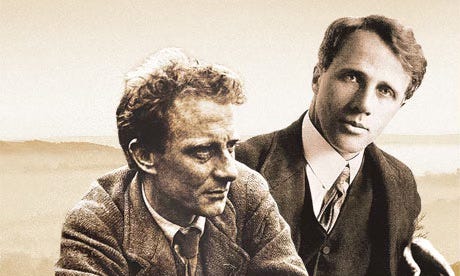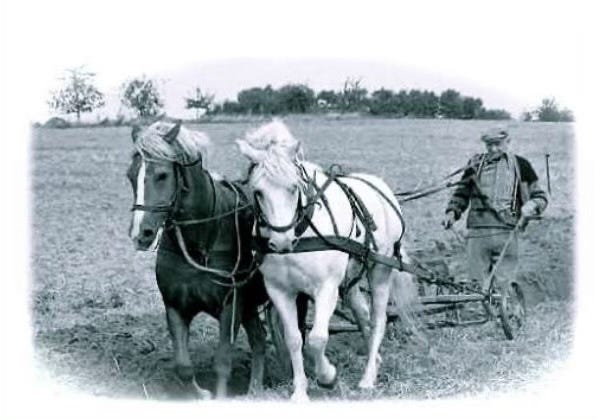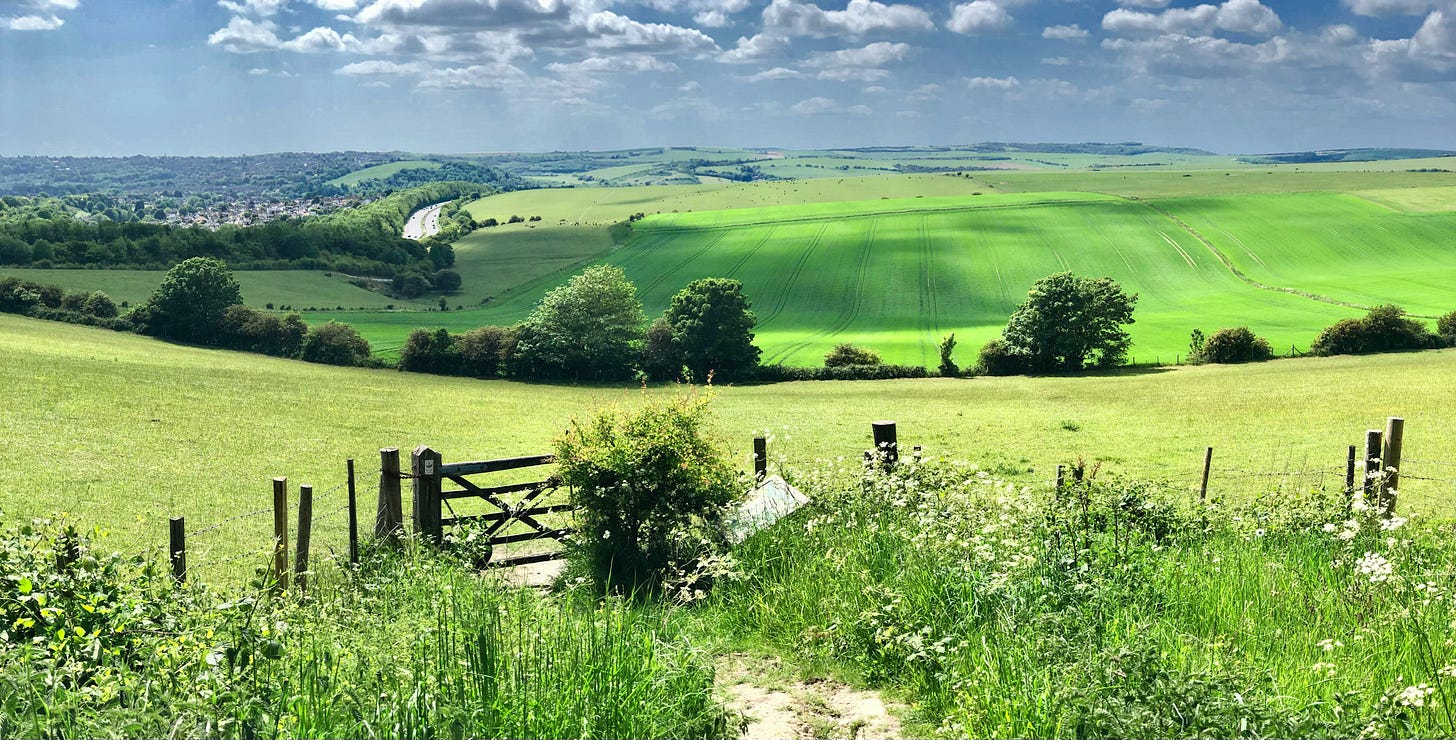What Happens Next?
From here to where you didn't know you wanted to be
I shall be telling this with a sigh Somewhere ages and ages hence: Two roads diverged in a wood, and I— I took the one less traveled by, And that has made all the difference.
These lines from ‘The Road Not Taken’ by Robert Frost were written for his friend Edward Thomas. The intense creative relationship which formed between Frost and Thomas in the months before the 1st World War, was formed near the town of Ledbury—now the home of the UK’s largest poetry festival.
They lived for a time in two cottages, three fields apart, and together they walked and talked as they crossed the fields, the woods and hills in the quiet Herefordshire and Gloucestershire countryside. It was during these long walks that Frost encouraged Thomas to consider himself a poet. Frost was sure the prose Thomas was writing had poetry within it.
By June 1915, Thomas was thirty-seven years old, and there was no expectation he should enlist. He nevertheless agonised about whether to join Frost on his return home to America, or to fight for his country. Frost intended ‘The Road Not Taken’ to be read as a playful dig at Thomas.
“The inspiration for it came from Frost’s amusement over a familiar mannerism of his closest friend in England, Edward Thomas. While living in Gloucestershire in 1914, Frost frequently took long walks with Thomas through the countryside. Repeatedly Thomas would choose a route which might enable him to show his American friend a rare plant or vista; but it often happened that before the end of such a walk Thomas would regret the choice he had made and would sigh over what he might have shown Frost if they had taken a ‘better’ direction.”1
When Frost sent Thomas his poem, Thomas missed the ironic prod aimed his way, and read the poem as most do, as a lyrical, naturally symbolic poem. Thomas eventually signed up in 1915, and was killed shortly after arriving in France on 9th April 1917 at Arras when a shell passed through his body.
The road not taken by Thomas led to America, and the freedom to write as Frost did, while the path he chose led to his death.
We can’t see into the future, and none of us know where our paths will lead.
This is the truth of our human condition, that we must always choose and in doing so, be aware saying yes to one thing is always saying no to another. Thomas faced a bifurcation in the path ahead. In one direction lay a country far away from the industrialised killing in the trenches, one where no one (yet) feared the draft or the possibility of invasion—America.
The other direction, the path Thomas chose, buttressed by the abstract notion of duty, rose from another ideal. It is clear Thomas, a man who earned most of his living as a travel writer, wanted to protect, to stand for, the English countryside he knew so well.
In his 1916 poem ‘As the Team's Head Brass’ written in iambic pentameter (Shakespeares’ metre), Thomas depicts a narrator observing a farmer ploughing his fields using horses. Two lovers enter the woods and become hidden from view. The farmer and narrator strike up a conversation. ‘Have you been out?’ (meaning to the war in France) the farmer asks. ‘No’, the narrator replies. We imagine the farmer raising his eyebrows.
… "And don’t want to, perhaps?” “If I could only come back again, I should. I could spare an arm. I shouldn’t want to lose A leg. If I should lose my head, why, so, I should want nothing more.
Thomas, the poet, wrestling with the consequential decision he has to make. The narrator asks the farmer:
… "Have many gone From here?” “Yes.” “Many lost?” “Yes, a good few. Only two teams work on the farm this year. One of my mates is dead. The second day In France they killed him."
Thomas couldn’t know what his fate would be, that he would be killed days after finally landing in France himself. The farmer continues to reflect:
… "It was back in March, The very night of the blizzard, too. Now if He had stayed here we should have moved the tree.” “And I should not have sat here. Everything Would have been different. For it would have been Another world.”
Choice and consequence
When I was in the dark place, I couldn’t see any light. The tunnel led down all the way to the centre of the earth, there was no light to see. I just walked, and over weeks, then days, then years, I slowly discovered a new path. When I said to my friend it was like a light had been switched on in the dark tunnel, it was the moment when I began to see the future, however hazy and dim it still was.
I believe in very few absolutes. My outlook tends toward possibility, rather than dogma—my reaction to my Catholic upbringing may have something to do with this. Whenever I have taken the Myers Briggs test, however, it suggests I am more than usually prone to thinking big and in new directions, so maybe this is an innate part of who I am.
Your time is limited, so don’t waste it living someone else’s life.
Steve Jobs
There are, however, a couple of beliefs I hold onto. The first is what you put out into the world comes back to you, precisely because you don’t expect it to.
I believe kindness is a superpower, the cost of which is free but whose value is beyond measure. There are many ways I see small kindnesses returning unbidden, and it makes me feel happier to be kind anyway. The real magic lies in offering kindness in a non-performative manner—it is best offered without expectation, and unobserved by none other than the subject of your kindness. Sometimes, even without their knowledge.
The reverse logic holds: I think mean people eventually tend to find themselves friendless, or at the very least, diminished.
My second ‘truth’ is this—don’t be a victim. If you’ve read my previous posts, you might be surprised at this. Weren’t the times I’ve described feeling lonely and in despair precisely because I played the role of victim?
My answer to this quite reasonable charge is no. The loneliness I felt was a consequences of decisions that were made. I didn’t choose the situation I found myself in, but I was there anyway.
The hardest part was learning to park the confusion, and then to look away from the past. As the man said, to wake up and live the life I want to live, not someone else’s.
We can all do with a bit of help along the way
When my friend, the poet Lynette Thorstensen, invited me to join a conversation with a small group of fellow dreamers, I had no idea where the conversation would lead. None of us did.
Over the months, we began to shape our ideas and eventually we decided to set up Néos Delta. Our analysis is that the world needs transformation—néos, new, novel, fresh and —delta, change. The big idea is to run retreats, always with the guiding idea of a transformation. This might be transformation at the community, organisation or personal level.
At our first meeting, we were all asked to say why we were interested in being part of the conversation, what drew us in. For me, there were two aspects.
The first was an opportunity to find renewed meaning and purpose in my life. The second, emerged in a straight line from this first thought and was the realisation that despite retiring from the world of work, I still had energy and a desire to affect change. In that very first conversation I talked about the strange way that a retirement conventionally meant stepping away from things, just when you had the requisite wisdom to make your best decisions.
We all felt the same way, even those still fully in their working journey. There are always thresholds, moments when we make a choice about which way to go.
The 3rd Act of a story is the best bit, where all the juiciest action takes places. It is the climax. When I thought about retirement, there was something radical about re-framing this story in a new way. It didn’t have to be beige, but instead I could write myself a fitting and suitably climactic 3rd Act.
The idea that it is possible to reclaim the future changed everything for me. When the light in the tunnel switched on again, I found there were choices I never thought were possible.
What’s Next? — Clarity and Purpose in Your Third Act
We are running a 3rd Act retreat this October. Honestly, this is a retreat I would go on if I wasn't already involved. Erina Reddan and I will be hosting a small group in Being Saatva, a beautiful and inspiring luxury eco-resort in Bali. Our goal is to help people discover their path, one that leads them to the future they choose. I’m not selling here, but I am sharing, because I’m surprised at what happens when you make saying yes the default attitude.
I also want to illustrate a new journey can begin, even when it feels as though the light of the future has been turned off.
Hope—a non-negotiable requirement for happiness
When I consider how I found a route out of the dark place, it seems fully a mystery that it led to the life I lead today. The reason I started writing these posts is because I hope that whatever I learned might be useful to someone else. I’m back to the idea of putting things into the world here, without any expectation of return.
The world is currently short on hope too. Rediscovering the link between hope and happiness was a revelatory process for me. I could never have mapped my way to the life I’m in now, I just had to keep on walking.
I think of Thomas at his battery in the ruins of Arras, the choice he made. What he might have been able to achieve if he had taken another road and the pleasure we would all have had as a consequence, reading his work.
I wish he had decidedly differently, for his family, for his future readers, but mostly for him. I prefer to imagine him back home out on his long walks, his mind noting the small things and the large things, then knitting something profound and beautiful from them for us to share.
And so I choose to carry on walking, not knowing where it will lead. Hoping it will be somewhere good.
‘Selected Letters of Robert Frost’ edited by Thompson







